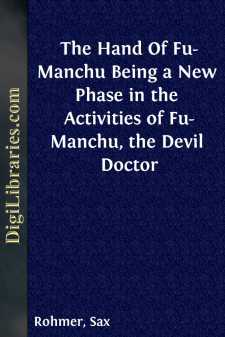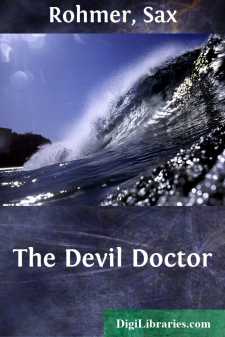Categories
- Antiques & Collectibles 13
- Architecture 36
- Art 48
- Bibles 22
- Biography & Autobiography 813
- Body, Mind & Spirit 142
- Business & Economics 28
- Children's Books 15
- Children's Fiction 12
- Computers 4
- Cooking 94
- Crafts & Hobbies 4
- Drama 346
- Education 46
- Family & Relationships 57
- Fiction 11829
- Games 19
- Gardening 17
- Health & Fitness 34
- History 1377
- House & Home 1
- Humor 147
- Juvenile Fiction 1873
- Juvenile Nonfiction 202
- Language Arts & Disciplines 88
- Law 16
- Literary Collections 686
- Literary Criticism 179
- Mathematics 13
- Medical 41
- Music 40
- Nature 179
- Non-Classifiable 1768
- Performing Arts 7
- Periodicals 1453
- Philosophy 64
- Photography 2
- Poetry 896
- Political Science 203
- Psychology 42
- Reference 154
- Religion 513
- Science 126
- Self-Help 84
- Social Science 81
- Sports & Recreation 34
- Study Aids 3
- Technology & Engineering 59
- Transportation 23
- Travel 463
- True Crime 29
Fire-Tongue
by: Sax Rohmer
Description:
Excerpt
CHAPTER I. A CLIENT FOR PAUL HARLEY
Some of Paul Harley's most interesting cases were brought to his notice in an almost accidental way. Although he closed his office in Chancery Lane sharply at the hour of six, the hour of six by no means marked the end of his business day. His work was practically ceaseless. But even in times of leisure, at the club or theatre, fate would sometimes cast in his path the first slender thread which was ultimately to lead him into some unsuspected labyrinth, perhaps in the underworld of London, perhaps in a city of the Far East.
His investigation of the case of the man with the shaven skull afforded an instance of this, and even more notable was his first meeting with Major Jack Ragstaff of the Cavalry Club, a meeting which took place after the office had been closed, but which led to the unmasking of perhaps the most cunning murderer in the annals of crime.
One summer's evening when the little clock upon his table was rapidly approaching the much-desired hour, Harley lay back in his chair and stared meditatively across his private office in the direction of a large and very handsome Burmese cabinet, which seemed strangely out of place amid the filing drawers, bookshelves, and other usual impedimenta of a professional man. A peculiarly uninteresting week was drawing to a close, and he was wondering if this betokened a decreased activity in the higher criminal circles, or whether it was merely one of those usual quiescent periods which characterize every form of warfare.
Paul Harley, although the fact was unknown to the general public, occupied something of the position of an unofficial field marshal of the forces arrayed against evildoers. Throughout the war he had undertaken confidential work of the highest importance, especially in regard to the Near East, with which he was intimately acquainted. A member of the English bar, and the last court of appeal to which Home Office and Foreign Office alike came in troubled times, the brass plate upon the door of his unassuming premises in Chancery Lane conveyed little or nothing to the uninitiated.
The man himself, with his tropical bronze and air of eager vitality, must have told the most careless observer that he stood in the presence of an extraordinary personality. He was slightly gray at the temples in these days, but young in mind and body, physically fit, and possessed of an intellectual keenness which had forced recognition from two hemispheres. His office was part of an old city residence, and his chambers adjoined his workroom, so that now, noting that his table clock registered the hour of six, he pressed a bell which summoned Innes, his confidential secretary.
"Well, Innes," said Harley, looking around, "another uneventful day."
"Very uneventful, Mr. Harley. About a month of this and you will have to resume practice at the bar."
Paul Harley laughed.
"Not a bit likely, Innes," he replied. "No more briefs for me. I shall retire to Norfolk and devote my declining years to fishing."
"I don't know that fishing would entirely satisfy me," said Innes....












